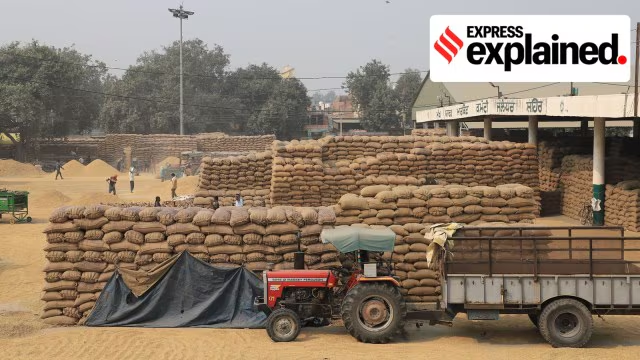Tags
Overflowing Godowns, Unhappy Millers: Why Punjab’s paddy procurement has been delayed
In the long term, Punjab must diversify its crop base to avoid the problem of surplus which lies at the heart of the current crisis.
Written by Anju Agnihotri Chaba

The paddy procurement process in Punjab has been marred by significant delays and mismanagement this year.
Despite favourable weather conditions, the pace of harvesting has slowed down due to almost 90% of the procured crop being stuck in mandis, and private rice millers refusing to store government paddy. This situation, stemming from a combination of logistical, bureaucratic, and political factors, is likely to worsen without swift intervention.
How does paddy procurement work ?
The Centre, in consultation with state governments and the Food Corporation of India (FCI), finalises estimates for paddy procurement every year prior to the commencement of the kharif marketing season (October to September).
State government agencies and the FCI purchase paddy from farmers within a stipulated period for the central pool at the Minimum Support Price (MSP). This paddy is milled, after which the procured rice is transported by the FCI to government storage facilities across the country. There it is stored for maintaining the buffer stock, or further distributed for consumption under the National Food Security Act (NFSA) and other welfare schemes.
What is the current status of paddy procurement in Punjab?
As of October 23, only 37.68 lakh tonnes of paddy has been procured by the FCI from Punjab, well below the 49 lakh tonne mark at the same time last year, and a far cry from the expected 185 lakh tonnes for the entire season. The peak procurement season ends in the first week of November.
The slow movement of procured paddy from the mandis (grain markets) is the biggest concern. While around half of the procured paddy had already been moved out of the mandis this time last year, this year a little more than a tenth of the procured paddy (10.55% or 8.7 lakh tonnes) has left the mandis. This is glut of paddy in the mandis is slowing down the entire procurement process.
What explains this situation in Punjab?
There are three primary factors at play.
Lack of storage space: Private rice millers are resisting taking in government paddy due to a space crunch in government go-downs. Millers are concerned that they would themselves have to store this paddy for an entire year — something not many are keen to do.
This problem emanates from a previous one. Punjab, this year, could move only 7 lakh tonnes of the roughly 124 lakh tonnes of milled rice in its government godowns. This has left very little space in these godowns to store milled rice from this year.
Controversy around hybrids: Adding to the problem are certain privately-developed hybrid varieties that have seemingly inundated the market this year. Millers claim that these non-recommended hybrids are responsible for a lower milling out-turn ratio (OTR) than FCI standards demand, making them a loss-making proposition.
OTR refers to the proportion of rice that is extracted from paddy after the milling process. Millers have to deliver an OTR of 67% per quintal. If the out-turn is lower, they must pay thegovernment for the difference. Millers say that the hybrids in question have an OTR of only 60% to 62%, leading to a loss of roughly Rs 300 per quintal .Troubles from labour, arhtiyas: Arhtiyas (commission agents) are the middlemen in the grain procurement process. They are now demanding a compensation of 2.5% on crop purchase as opposed to the current system of fixed remuneration of Rs 46 per quintal. Mandi labourers too are seeking higher wages, comparable to their counterparts in Haryana. Protests by these groups have further stalled the procurement process.
What is the impact of the delay in paddy procurement?
Only 22% of the paddy crop has been harvested so far — roughly 20% less than last year. Farmers are deliberately slowing down the harvest process because mandis simply do not have space to store their crop. They hope this would mitigate the risk of distress sales caused by the grain spoiling in poor storage conditions.
However, the longer paddy stands on the field, the greater the risk of weight loss and overall quality deterioration, which too leads to a fall in prices. This means that a persistent delay in paddy procurement will lead to significant economic distress among farmers.* With farmers typically sowing the winter wheat crop in November, a delay in harvesting paddy also threatens to throw off the state’s agricultural cycle. This too can be very damaging for the state’s agriculture sector.
Moreover, a smaller window between harvesting paddy and sowing wheat is also likely to lead to more stubble fires, which lead to air pollution across much of North India.
A prolonged crisis could also spark unrest among farmers. This could quickly spiral into a law and order problem for the state, which would further compromise Punjab’s ability to manage the situation.
How can this crisis be managed?
The government urgently needs to find temporary storage solutions. The most readily available such solution would be to store paddy in Punjab’s 5,000 odd rice mills. But to do this, the government must first address the millers’ concerns which include OTR trials for hybrid varieties, and stricter regulation of seed certification.Better coordination between procurement agencies, transportation networks, and storage facilities, as well as timely payment of arhtiya commissions, and addressing labour demands will also help in improving the procurement process.In the long term, Punjab must diversify its crop base to avoid the problem of surplus which lies at the heart of the current crisis.
Published Date: October 25, 2024






